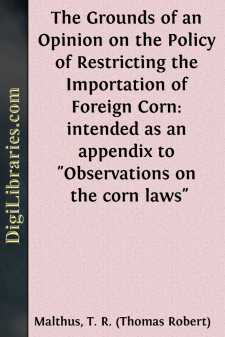Non-Classifiable
- Non-Classifiable 1768
Non-Classifiable Books
Sort by:
PREFACE In offering the American public a carefully studied outline of its national park system, I have two principal objects. The one is to describe and differentiate the national parks in a manner which will enable the reader to appreciate their importance, scope, meaning, beauty, manifold uses and enormous value to individual and nation. The other is to use these parks, in which Nature is writing in...
more...
I We are all of us familiar with the process of 'whitewashing' historical characters. We are past being surprised at finding Tiberius portrayed as an austere and melancholy recluse, Henry VIII pictured as a pietistic sentimentalist with a pedantic respect for the letter of the law, and Napoleon depicted as a romantic idealist, seeking to impose the Social Contract on an immature, reluctant...
more...
by:
W. D. Bayliss
Preface Some explanation appears to be due from us for writing this account of the Singapore Convict Jail so long after the date of its final abolition. The truth is, that for several years it has been our opinion that it ought to be written by some one, and the same suggestion had often been made to one of us by the late Doctor Mouat, Inspector General of Jails, Bengal, and others who were well...
more...
by:
Paul Allen
LIFE OF CAPTAIN LEWIS. Monticello, August 18, 1813. SIR, In compliance with the request conveyed in your letter of May 25, I have endeavoured to obtain, from the relations and friends of the late governor Lewis, information of such incidents of his life as might be not unacceptable to those who may read the narrative of his western discoveries. The ordinary occurrences of a private life, and those also...
more...
by:
Michael Twinchek
No description available
Materials and Apparatus One of the most important factors in the success of any piece of glass-blowing is the glass employed. As is well known, there are two general varieties of glass: Lead glass and soda glass. Formerly much apparatus was made of lead glass, but at present it is very seldom met with, except in the little drops of special glass used to seal platinum wires into the larger sizes of...
more...
The professed object of the Observations on the Corn Laws, which I published in the spring of 1814, was to state with the strictest impartiality the advantages and disadvantages which, in the actual circumstances of our present situation, were likely to attend the measures under consideration, respecting the trade in corn. A fair review of both sides of the question, without any attempt to conceal the...
more...
RIENZI, Wagner was greatly troubled in the beginning of his career about the choice of subjects for his operas. His first famous work, ‘Rienzi,’ is founded upon the same historical basis as Bulwer's novel bearing the same name, and is a tragic opera in five acts. The composer wrote the poem and the first two acts of the score in 1838, during his residence at Riga, and from there carried it...
more...
Chretien De Troyes has had the peculiar fortune of becoming the best known of the old French poets to students of mediaeval literature, and of remaining practically unknown to any one else. The acquaintance of students with the work of Chretien has been made possible in academic circles by the admirable critical editions of his romances undertaken and carried to completion during the past thirty years...
more...
by:
Samuel McHarry
When I first entered on the business of Distilling, I was totally unacquainted with it. I was even so ignorant of the process, as not to know that fermentation was necessary, in producing spirits from grain. I had no idea that fire being put under a still, which, when hot enough, would raise a vapour; or that vapour when raised, could be condensed by a worm or tube passing through water into a liquid...
more...











